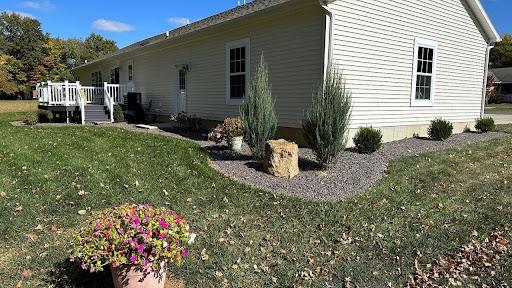Blogs

What Are Some Eco-Friendly Landscaping Practices To Consider?
Eco-friendly landscaping practices include using native and drought-tolerant plants, installing rain gardens, and applying organic mulch. Implement drip irrigation, permeable paving, and compost to enrich the soil. Reduce chemical use and encourage beneficial insects with companion planting.
Eco-friendly landscaping is more than a trend; it's a responsible approach to designing and maintaining outdoor spaces. These practices not only enhance the beauty of your property but also contribute to environmental sustainability. From selecting native plants to implementing water conservation techniques, there are various ways to make your landscape eco-friendly.
At Arrow Valley Landscaping, we specialize in creating beautiful and sustainable outdoor living spaces, ensuring that your landscape is both functional and environmentally friendly.
Key Takeaways
Choose native and drought-resistant plants.
Utilize rainwater harvesting and smart irrigation systems.
Practice composting and mulching for soil health.
Use sustainable and recycled materials for hardscaping.
Create habitats for local wildlife.
Eco-Friendly Landscaping Practices for Sustainable Outdoor Spaces
Sustainable Plant Selection
Native Plants: Choose plants that are native to your region as they are well-adapted to local soil and climate conditions, requiring less water and maintenance. Native plants support local wildlife and biodiversity, making them a crucial part of sustainable landscaping.
Drought-Resistant Plants: Incorporate drought-tolerant species to reduce water consumption. These plants are designed to thrive in arid conditions, minimizing the need for irrigation.
Water Conservation Techniques
Rainwater Harvesting: Install rain barrels or cisterns to collect and store rainwater for irrigation. This practice conserves water and reduces reliance on municipal sources, which is especially beneficial in drought-prone areas.
Smart Irrigation Systems: Use technology that adjusts watering schedules based on weather conditions and soil moisture levels to prevent overwatering and waste.
Soil and Waste Management
Composting: Create a compost pile to recycle organic waste, which enriches soil and reduces the need for chemical fertilizers. Composting helps retain moisture and improves soil structure.
Mulching: Apply a layer of organic mulch around plants to conserve moisture, suppress weeds, and improve soil quality. This practice also reduces the need for excessive watering.
Eco-Friendly Materials
Sustainable Hardscapes: Use eco-friendly materials for paths, patios, and other hardscapes. Consider options like permeable paving that allows water to infiltrate the ground, reducing runoff and promoting natural filtration.
Recycled and Locally Sourced Materials: Opt for recycled materials and locally sourced products to minimize environmental impact and support local economies.
Wildlife Support
Creating Habitats: Design your landscape to provide food and shelter for local wildlife. This can include planting a variety of native species and creating features like birdhouses or bee hotels.
Rain Gardens: Implement rain gardens or bioswales to manage stormwater runoff, promote water infiltration, and create habitats for beneficial insects and wildlife.
Benefits of Native Plants in Landscaping
Native plants are essential for creating eco-friendly landscapes. These plants are adapted to the local environment, making them more resilient to pests and diseases. They require less water and maintenance, which conserves resources and reduces environmental impact. Native plants also provide habitat and food for local wildlife, supporting biodiversity. By choosing native species, you can create a sustainable landscape that thrives naturally. Incorporating native plants into your garden can also enhance its beauty with a variety of colors and textures, reflecting the unique character of your region. Arrow Valley Landscaping can help you select and plant native species that will flourish in your area, creating a vibrant and sustainable outdoor space.
Water-Wise Landscaping Techniques
Water-wise landscaping, also known as xeriscaping, focuses on reducing water usage while maintaining a beautiful garden. This approach involves selecting drought-resistant plants, using efficient irrigation systems, and incorporating mulch to retain soil moisture. Water-wise landscaping not only conserves water but also reduces maintenance and lowers water bills. Techniques like rainwater harvesting and drip irrigation ensure that plants receive adequate moisture without waste. Arrow Valley Landscaping can design and implement a water-wise landscape that meets your aesthetic and environmental goals. By adopting these practices, you can enjoy a lush garden that thrives even in dry conditions, making a positive impact on your local environment.
Sustainable Hardscape Options
Hardscaping elements such as patios, walkways, and retaining walls can be eco-friendly when constructed with sustainable materials. Permeable pavers, for example, allow water to seep into the ground, reducing runoff and promoting groundwater recharge. Recycled materials, like crushed concrete or reclaimed bricks, minimize environmental impact and reduce the demand for new resources. Using locally sourced materials also cuts down on transportation emissions. Sustainable hardscaping not only enhances the aesthetic appeal of your outdoor space but also supports environmental health. Arrow Valley Landscaping specializes in designing and installing hardscapes that balance beauty and sustainability, creating outdoor spaces that are both functional and eco-friendly.
The Role of Composting in Sustainable Gardening
Composting is a cornerstone of sustainable gardening, transforming organic waste into nutrient-rich soil. This practice reduces the need for chemical fertilizers and enhances soil health, promoting robust plant growth. Composting helps retain soil moisture, reducing the need for frequent watering and contributing to water conservation. It also diverts organic waste from landfills, reducing methane emissions and supporting a circular economy. By incorporating compost into your garden, you can create a healthier, more sustainable landscape. Arrow Valley Landscaping can assist you in setting up a composting system and integrating compost into your garden design, fostering a greener and more productive outdoor space.
FAQs
What are native plants, and why are they important? Native plants are species that occur naturally in a specific region. They are important because they are well-adapted to local conditions, require less maintenance, and support local wildlife.
How can I conserve water in my garden? You can conserve water by using drought-resistant plants, installing smart irrigation systems, and collecting rainwater for irrigation.
What is a rain garden, and how does it help the environment? A rain garden is a planted depression that absorbs rainwater runoff from impervious surfaces. It helps reduce flooding, improves water quality, and provides habitat for wildlife.
Why should I use recycled materials in my landscape? Using recycled materials reduces environmental impact, conserves resources, and supports local economies. It also adds unique character to your landscape.
What are the benefits of composting? Composting enriches soil, reduces the need for chemical fertilizers, retains moisture, and diverts organic waste from landfills, reducing greenhouse gas emissions.
Embrace Sustainable Landscaping with Arrow Valley Landscaping
Creating an eco-friendly landscape is a rewarding endeavor that benefits both your property and the environment. By incorporating sustainable practices, you can enjoy a beautiful, functional, and environmentally responsible outdoor space. Arrow Valley Landscaping is dedicated to helping you achieve your landscaping goals with eco-friendly solutions that enhance the beauty and value of your property.
Contact us now to schedule a consultation and discover how we can transform your landscape into a sustainable haven. Call Arrow Valley Landscaping today and take the first step towards a greener future for your home and community.

With years of experience serving Illinois, we’re proud to be the trusted choice for a professional and high quality landscaping.
Contact Us
Phone:
Email:
Address
© 2026 Arrow Valley Landscape ltd. All Rights Reserved. Privacy Policy. Web Design by Fused Media



